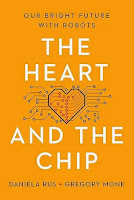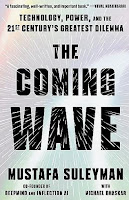THE HEART AND THE CHIP by Daniela Rus and Gregory Mone is a generally optimistic non-fiction work that is subtitled “Our Bright Future with Robots.” Author credentials are impressive and contribute to making this a relevant, easy to read text: Rus is actively involved in the robotics field as director of MIT’s Computer Science and Artificial Intelligence Laboratory and Mone has co-authored several other texts with scientists like Susan Cain, Bill Nye and Neil deGrasse Tyson. Rus and Mone have divided their new text into three parts: Dreams, Reality, and Responsibility. Focusing on robotics, artificial intelligence (AI), and machine learning, they are adept at providing useful definitions (“a robot is a machine capable of following and repeating these three steps: (1) Sense (2) Think (3) Act”) and distinctions: “machine learning and artificial intelligence are often confused, as the latter has become a business and marketing buzzword, but you can think of machine learning as pattern recognition systems that work in service of AI, to assist with higher-level decision-making and reasoning.”
It was also
very exciting to read about their positive spin on current (e.g., using scans
in medical diagnoses with significantly reduced error rates when humans
and robots work together) and future applications (e.g.,
developing exoskeletons to improve the mobility for older people), including numerous
suggestions (a wish list, really) for inventions capable of meeting needs like: smarter, more sensitive hands; softer, safer robots; more agile robots
(and perhaps ones that are better at anticipating human actions, especially when
driving); ways to build robots faster; incorporating better artificial muscles and
more powerful batteries, plus better sensors and faster brains; and mechanisms
for communicating more naturally with robots. Yet another section outlines
eleven attributes for future robotics systems, addressing questions of
regulation and ethics at a high level. Rus and Mone acknowledge that there is
vast potential for malicious hackers and see the need for cybersecurity as a reason
that could “spur tremendous job creation.” Roughly five percent of the text is
notes for reference by readers and researchers.







